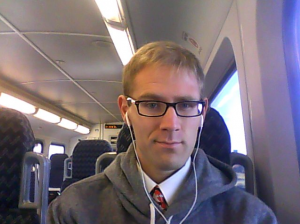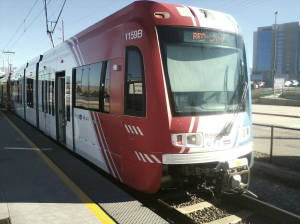Ryan Mills, a junior at BYU, gets up at 6:30 a.m. for his 10 a.m. classes every day.

Mills lived in Provo for his freshman and sophomore years at BYU but moved to West Jordan when he got engaged. His fiancée will be student teaching in Ogden in January, so the couple decided Mills would live halfway between Ogden and Provo to avoid an especially long commute to Ogden.
The commute, Mills said, can be difficult, but it’s a sacrifice he’s willing to make.
Commuters like Mills say the BYU faculty and students are helpful, but they could help ease the stress from commuting by being sympathetic to problems outside of commuters’ control and by providing more drop-off spots and cheaper transportation passes.
Mills starts his two-hour trip to school every day with the TRAX in West Jordan at 7:30 a.m. From the TRAX he boards the FrontRunner in Murray and rides to a bus that finally takes him to campus. His whole trip is more traveling in one day than many students living on or off campus have to think about.
Mills has traveled to school like this since the beginning of the semester. He has only been late to class once, when a train malfunctioned. “I’ve got it down to a science where I’m never late,” he said. He’s usually at school 20 minutes before class starts, but the time he was late, he missed a quiz.
Mills said he wished his professor had given him a little more leeway.
“I understand why he’d say it’s not fair for the (other) students,” Mills said. “But when it’s something completely out of my control, I wish I would’ve gotten a little more help with that.”
Mills has his routine down, but sometimes roadblocks force him to shift his schedule. One of his finals this semester starts at 7 a.m. The earliest train from Murray doesn’t leave until 6:20 a.m. Mills plans to spend the night at a friend’s house to make the test.

“I wish there was a way around it, but at the same time I know the university is very strict and organized and doesn’t give a lot of wiggle room,” Mills said. “That’s something I have to live with and realize that it’s a sacrifice I have to make with my choice of not living in Provo.”
DeeAnn Peterson, a senior at BYU, moved to Springville in July. Her husband gives her a ride every morning, so she doesn’t have to deal with parking at the school, but her biggest frustration is getting around campus.
Peterson said getting through traffic lights is hard because some of the lights don’t last very long and everyone’s trying to get through them.
“You can’t get to the campus,” she said. “You have to go around it. … It would be so much more helpful if we had more drop-offs closer to the buildings where we’re going.”
Although small things like being delayed by a train or getting held up in traffic can cause school and work discomfort, Mills, Peterson and students like them learn to adapt.
“You have to make sure it’s part of your schedule, and you recognize the need to get (to) places a little earlier than normal, just in case,” Mills said. He follows UTA’s Twitter account, @RideUTA, to see when there are delays.
While Mills’ experience with being late has been unsatisfactory, Peterson said her boss and professors have shown understanding.
“The professors are really willing to work with you if you talk to them,” Peterson said. “Another university would not be like that.”
Hoping for a bigger subsidy
Mills said he wishes BYU would help with UTA student pass prices.
“I’d like to see the university make a bigger effort to accommodate people who don’t live in town,” he said. “We have a small subsidy on UTA passes, but that’s it.”
BYU offers regular student UTA passes for $62.75 for 30 days and premium passes for $148.50, also for 30 days. Mills compared the price to UVU’s pass, which is $80 and valid from Aug. 1, 2014, until Aug. 31, 2015. A pass for a year and a month for UVU students is just more than half of a BYU student’s premium 30-day pass, which will give students access to TRAX and FrontRunner.
Remi Barron, a UTA spokesperson, said the difference in cost is because of UVU’s “three-source funding approach,” which includes a transportation fee each student is charged as part of registration fees each semester, UVU administration’s contributions and the $80 fee UVU students pay when buying the pass.
Remaining part of the BYU community
Mills said he understands why BYU administration wants students to live on campus, but they should accommodate students whose life choices make studying at BYU difficult because it’s hard to get to school.
“I would want students and staff to recognize we are making a huge sacrifice to be part of BYU, and sometimes we need a little support,” Mills said. “I don’t want to be a forgotten or neglected part of the BYU community. We are BYU just as much as on-campus students.”
Peterson said communication can help the culture at BYU. “The culture here is to help each other out.”




